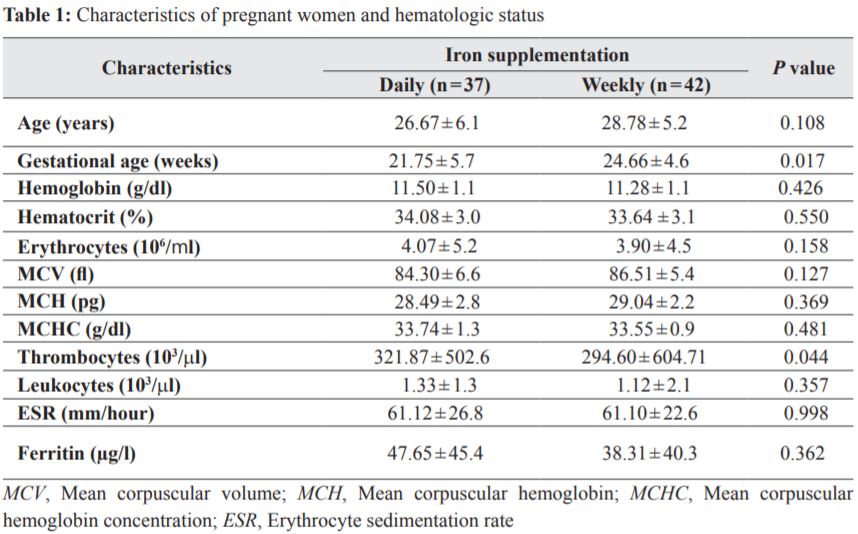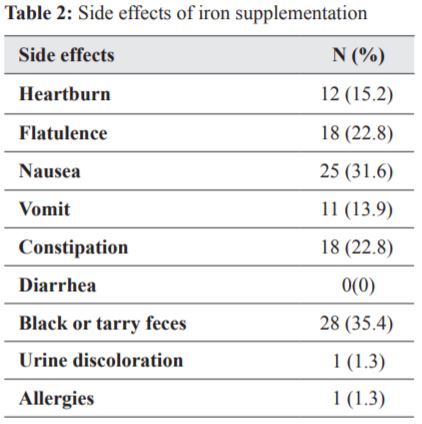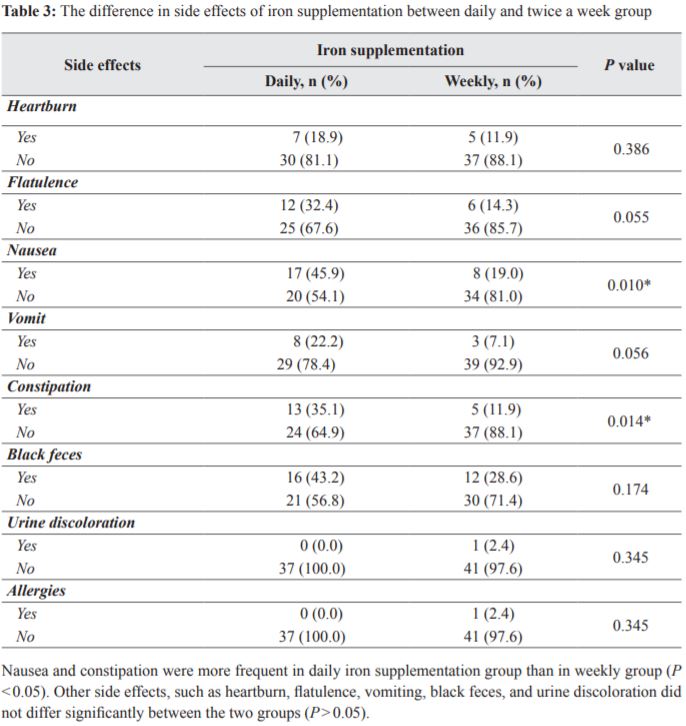
Journal of the Bahrain Medical Society
Year 2019, Volume 31, Issue 1, Pages 17-22
https://doi.org/10.26715/jbms.2019.1_05022019Muhammad Rizki Yaznil1*, Muara Panusunan Lubis1 , Sarma Nursani Lumbanraja1 , Melvin Nova Gunawanto Barus1 , Adriani Sakina1 , Munauwarus Sarirah1
1Department Obstetrics and Gynecology, Faculty of Medicine, Universitas Sumatera Utara, Medan, Indonesia
*Corresponding author:
Muhammad Rizki Yaznil, Department Obstetrics and Gynecology, Faculty of Medicine, Universitas Sumatera Utara, Medan, Indonesia, Tel.: +62-61-8363760, Email: rizki.yaznil@usu.ac.id
Received date: November 23, 2018; Accepted date: February 05, 2019; Published date: March 31, 2019

Background & Objective: Iron supplementation in pregnant women is highly recommended, however there is reduced compliance due to the common gastrointestinal side effects. This study aimed to compare the clinical side effects between pregnant women with daily and weekly iron supplementation.
Methods: Seventy-nine pregnant women who met the inclusion and exclusion criteria were given iron supplements every day (group 1, n=37) and twice a week (group 2, n=42). All numerical data were assessed by independent t-test. Side effects were assessed after one month of administration using a questionnaire containing complaints felt by pregnant women and were evaluated by chi-square test using SPSS 25. A P value <0.05 was considered as statistically significant.
Results: The most common side effects of iron supplementation in both groups were black feces (35.4%) and nausea (31.6%). Nausea (45.9% vs. 19.0%; P<0.05) and constipation (35.1% vs. 11.9%; P<0.05) were more frequent in group 1 than in group 2, respectively. Other side effects, such as heartburn, flatulence, vomiting, black feces, and urine discoloration did not differ significantly between the two groups (P>0.05).
Conclusion: The daily iron supplementation elevated the episodes of nausea and constipation during pregnancy than the weekly supplementation. The daily iron supplementation in pregnant women increases the risk of side effects, potentially reducing compliance.
Keywords: Iron supplement, pregnancy, side effects, daily, weekly
One of the most common problems in pregnancy is iron deficiency anemia.1 The World Health Organization defines anemia in pregnant women as hemoglobin concentration less than 11.0 g/dl.2 Iron deficiency in pregnant women is due to increased iron requirements, especially in the second and third trimesters.3 In these trimesters, there is a rise of red blood cells and hemoglobin for the growth of the placenta and fetus.4 Low intake and poor iron absorption are risk factors for anemia.5 Iron deficiency in pregnancy increases the risk of maternal and child mortality and has negative impact on the cognitive and physical development of children.6 The daily recommended intake of iron supplement in pregnant women is 50% higher than the non-pregnant. Therefore, iron supplement to pregnant women is highly recommended.7
Low compliance in consumption of iron in pregnant women mainly because of gastrointestinal side effects, such as nausea, flatulence, abdominal pain, diarrhea, constipation, and black or tarry feces.8 A recent study found that daily iron supplements increase lipid peroxidation9 and reduce zinc absorption.10, 11 Free iron has a pro-oxidizing effect, which catalyzes the formation of free radicals and causes cell damage. Free radical damage and lipid peroxidation are the causes of complications of pregnancy, such as pre-eclampsia12 and intrauterine growth restriction (IUGR).13
Several studies have been conducted to assess alternative regimens for iron administration in pregnant women, which would minimize side effects and increase compliance.14-16 A previous study showed no difference between daily and weekly iron supplementation in preventing iron deficiency anemia in pregnant women.17 Goshtasebi et al. concluded that daily or weekly iron supplementation has the similar effect.18, 15 Bouzari et al. observed that there were no significant differences in the concentrations of hemoglobin and serum ferritin in nonanemic pregnant women who consume iron three times a week, once a week, or every day.19 A recent study in India showed that weekly iron intake was considered effective in preventing anemia in nonanemic pregnant women, however it was less effective in anemic pregnant women.20 Thiobarbituric-acid-reacting-substances (TBARS), a marker of the end product of lipid peroxidation, was reported to increase significantly in the group of pregnant women with daily iron intake. Whereas, in the group administered with weekly iron supplementation, the increase in TBARS declined.21 Therefore, the purpose of this study was to compare the clinical side effects between pregnant women administered with daily and twice a week iron supplementation.
This prospective cohort study has been approved by Health Research Ethical Committee, Medical Faculty of Universitas Sumatera Utara/Haji Adam Malik General Hospital (260/TGL/KEPK FK USU-RSUPHAM/2018). The study, involving 79 pregnant women attending Belawan Health Center, was conducted from July 2018 to September 2018 in Medan City—one of the health centers with the highest number of pregnant women in Medan. The effect size of 33% (P1=43%, P2=10%)9 was used to estimate the sample size. Pregnant women who met the inclusion criteria (agreed to be a participant, 12– 28 weeks of gestational age, baseline hemoglobin concentration ≥10.0 g/dl) were given iron supplements every day (group 1, n=37) and twice a week (group 2, n=42). Oral iron supplements administered was tablet ferrous fumarate 180 mg; tradename PaphrosRx. The side effects were listed according to the leaflet of the drugs and explained thoroughly to all the participant to self-administer iron supplements for up to 3 months. Routine blood count, including hemoglobin, hematocrit, and serum ferritin levels was carried out. Side effects listed in the leaflet were assessed after one month of iron administration using a questionnaire containing complaints felt by pregnant women while consuming iron supplements.
All numerical data were assessed by independent t-test. Side effects of iron supplementation in daily and twice-a-week groups were evaluated using chi-square test. All data were analyzed statistically using SPSS 25. A P value < 0.05 was considered as statistically significant.
Among the 79 women enrolled, 37 (46.8%) and 42 (53.2%) were on daily and weekly iron supplementation, respectively (Table 1). There was no difference in age, hemoglobin concentration, hematocrit erythrocytes, mean corpuscular volume (MCV), mean corpuscular hemoglobin (MCH), mean corpuscular hemoglobin concentration (MCHC), leukocytes, erythrocyte sedimentation rate (ESR), and serum ferritin between the daily and weekly supplementation groups (P>0.05). The gestational age of the daily and weekly supplementation groups was the second trimester, despite statistically there was significant differences (P< 0.05). Side effects of iron supplementation were presented in Table 2 below.


The most common side effects reported in pregnant women in both the groups were black feces (35.4%) and nausea (31.6%). Flatulence and constipation were also common side effects (22.8%). The difference of side effects of iron supplementation between daily and weekly groups is presented in Table 3.

The gastrointestinal symptoms were the most common side effects of oral iron supplementation. Besides black or tarry feces as the most common gastrointestinal effect, diarrhea is another gastrointestinal symptom that could be found as a side effect of iron supplementation;8 however, in this study it was not observed. In a study conducted by Shafi et al.,22 the side effects of iron supplementation with a focus on the route of administration were evaluated. In contrast to the present study, they reported diarrhea in five women.
In the present study, urine discoloration was observed in the weekly group, although the result was not significant. The darker color of urine after consuming oral iron supplementation is possibly related to iron metabolism, especially the iron excreted in urine. Deferoxamine is a specific iron chelator that binds to ferric iron forming a water-soluble compound that is rapidly excreted by the kidney. Deferoxamine causes a vin rosé discoloration of the urine as side effect of iron intake. In other words, urine discoloration is a sign of the increasing iron excretion.23 The side effects of oral iron intake are often associated with a higher dose. The high doses of iron supplements have not provided optimal benefit for pregnant women.14
In the current study, among all side effects, nausea and constipation were more frequent in the daily group as compared to the weekly group. Despite no significant difference, flatulence and vomiting were more frequently observed in the daily group than in weekly group. A previous study conducted by Ahmed et al.24 showed that constipation was the most common factor for noncompliance of iron supplementation in pregnant women. Constipation had the highest percentage among all of factors, including nausea, diarrhea, heartburn and vomiting. A controlled trial study by Bilimale et al. found that forgetfulness was the main symptom followed by gastrointestinal symptoms as the side effects for low adherence of iron supplementation. The other symptoms included vomiting, nausea, heartburn, and diarrhea.25 This showed that the side effect would decrease the compliance of iron supplementation.
Gebremedhin et al. reported that side effect was the most underlying reason for nonadherence in pregnant women taking iron supplementation.26 In this study, almost all pregnant women were not informed about the side effects of iron supplementation, thus the compliance was low. Another study also showed that the impact of side effects would result in nonadherence in up to 50% participants.8 Therefore, the side effects of oral iron supplementation indirectly cause treatment failures and unnecessary follow-up investigations.
The daily iron supplementation caused comparatively increased nausea and constipation during pregnancy than the weekly supplementation. This indicates that the daily iron supplementation in pregnant women increases the risk of side effects, potentially reducing compliance. It is thus recommended that before the initiation of supplementation, the researcher or the medical professional should explain the details of oral iron supplementation, including dose, time of consumption, and any associated side effect.
The authors of this study have no conflicts of interest to declare.
We would like to thank the Ministry of Research, Technology, and Higher Education for grant funding.